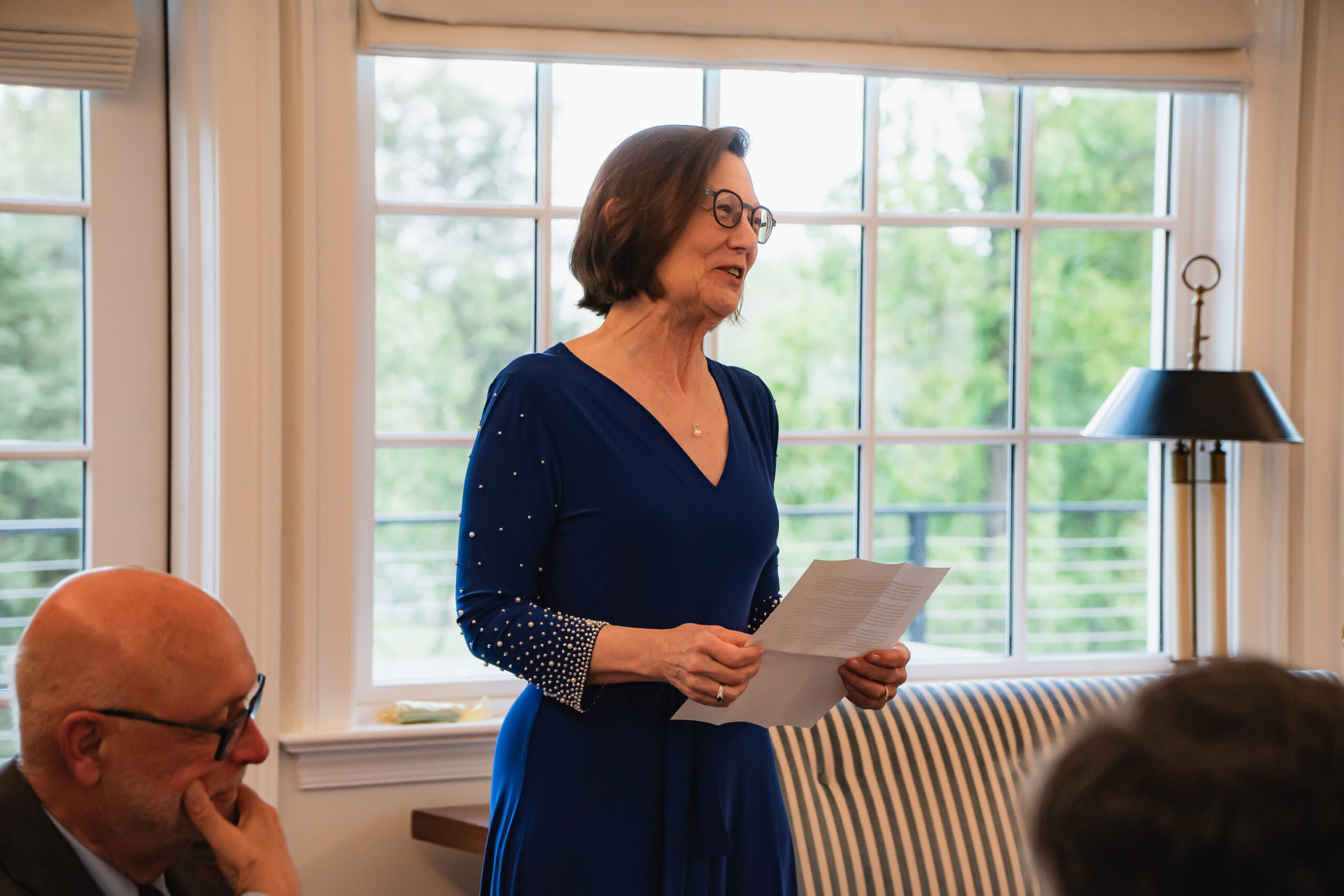
The Ministry of Mitzi Budde
Mitzi Budde, D.Min, Head Librarian and the Arthur Carl Lichtenberger Chair for Theological Research, retires after 33 years. The Rev. A. Katherine Grieb, Ph.D., ’83, reflects on the profound impact she has had on VTS.
Together we make The Episcopal Church stronger
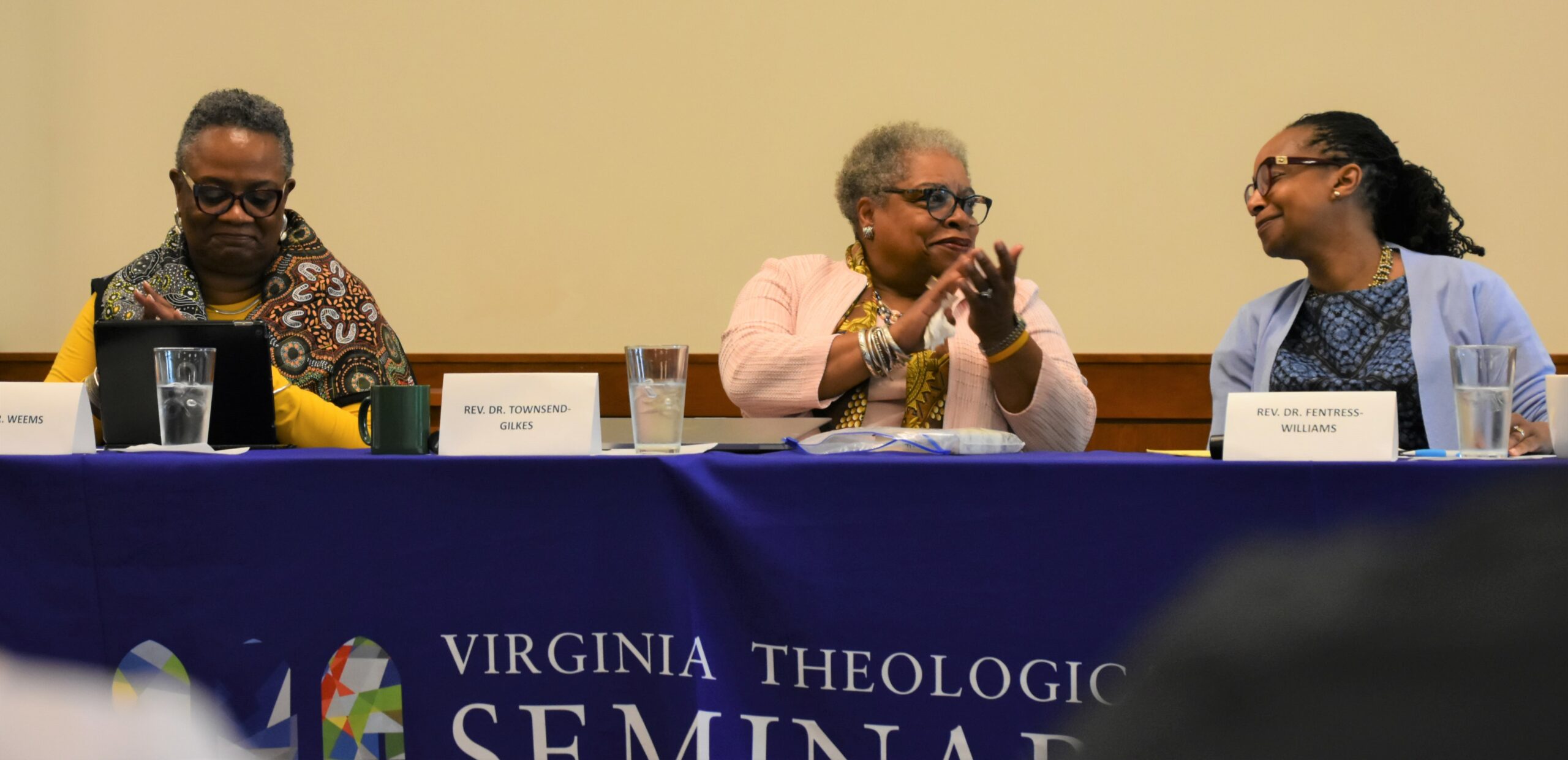
Womanist Conference presenters, (L-R), the Rev. Dr. Renita J. Weems, the Rev. Dr. Cheryl Townsend Gilkes, and the Rev. Dr. Judy Fentress-Williams. Photo: © 2023 Fredericka Sands
As VTS prepares to host more womanist scholars, Wendy A. Jordan looks back to the first Womanist Conference held by the Seminary.
In a 1979 story, “Coming Apart,” and again in her 1983 essay collection In Search of Our Mothers’ Gardens, African American writer and social activist Alice Walker used the term womanist to give voice to feminist issues, experiences, and ideas particular to Black women as opposed to white women. Marking 40 years since Walker’s seminal book was published, Virginia Theological Seminary (VTS) also gave voice to womanism, hosting “Womanist Conference 2023: The Power of Narrative & Voice” on April 29, 2023.
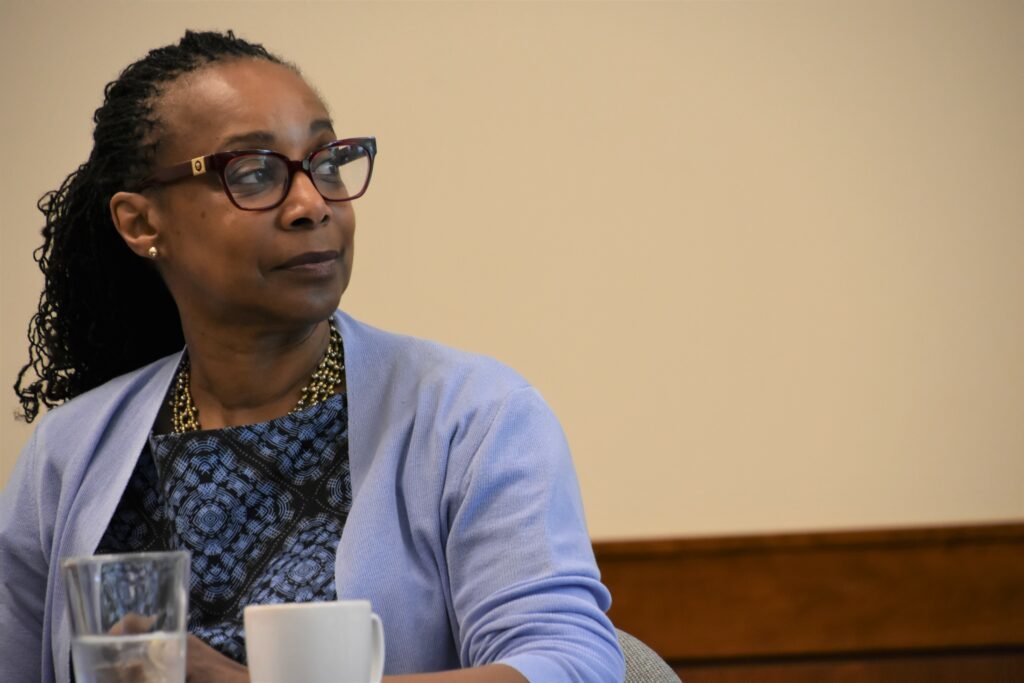
The Rev. Dr. Judy Fentress-Williams at the conference. Photo: © 2023 Fredericka Sands
The program drew 68 attendees to campus with another 53 participants joining online from around the country. “It was groundbreaking in that it was at VTS,” said the Rev. Judy Fentress-Williams, Ph.D., VTS Dodge Professor of Biblical Interpretation. “Here at seminary, we are invested in the formation of students to become priests,” and the conference was integral to that preparation. “The womanist approach to academic study is an approach that is needed,” she said.
The idea for the conference came from the Rev. Janettarose Greene ’23, 2022 VTS student body president. “While the seminary is doing a lot of work in the area of reparations, owning up to and addressing past wrongs toward Black people, not much of that work is seminarian focused,” she explained. “I participated in these activities in 2022, but thought: ‘Wouldn’t it be wonderful if we could do something that would touch the students?’”
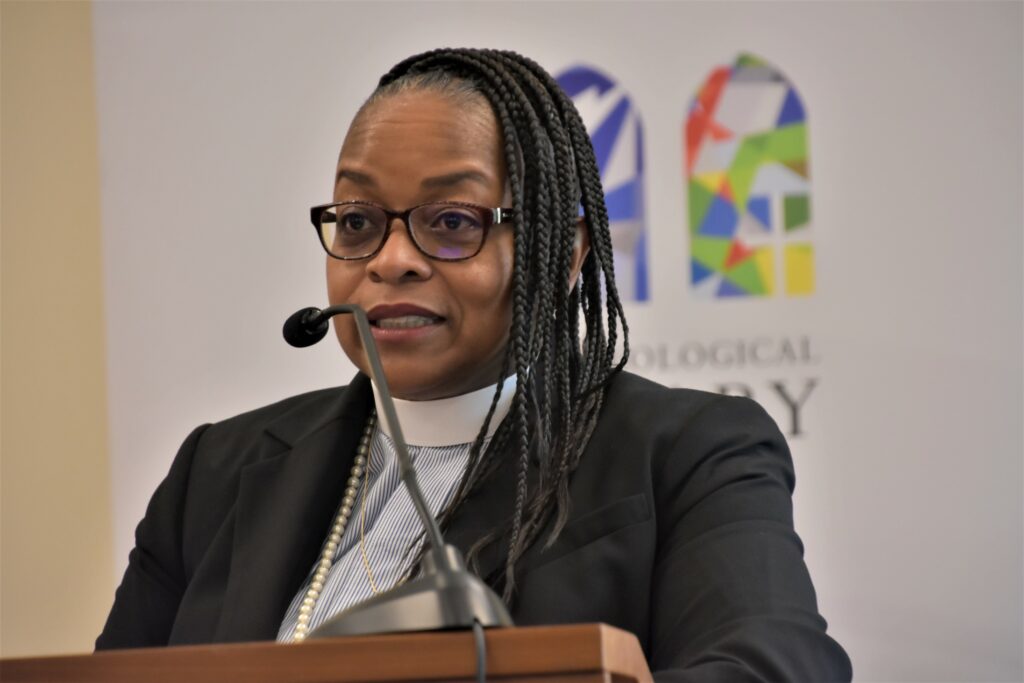
Conference organizer the Rev. Janettarose Greene ’23. Photo: © 2023 Fredericka Sands
Greene spoke to Fentress-Williams about her idea to enlist her support for a womanist conference. Fentress-Williams signed on as facilitator and a faculty sponsor of the conference. “I very much wanted this conference at VTS,” she said.
The Rev. Rachelle Sam, Associate Dean of Students, also was a faculty sponsor. Other sponsors from VTS included the Office of the Dean and President, Multi-Cultural Ministries, and Lifelong Learning, as well as external sponsors the Episcopal Evangelism Society, Alfred Street Baptist Church, Alexandria, VA, and the DiPasquantonio and Greene Family Foundation.
The program featured prominent womanist voices from academia. The event was described as “a step toward healing the church and restoring it to its place as the source of life for the community, as it lifts up the gifts and talents of all people and amplifies the histories and experiences of Black women; helping to identify the church, to society, as centered in Jesus’ Way of Love and as justice focused.” Its goal was to “embolden the cultural identity of a non-dominant group in their witness to Jesus… equipping participants to invite others to engage the Good News of God’s restorative work in Jesus Christ.”
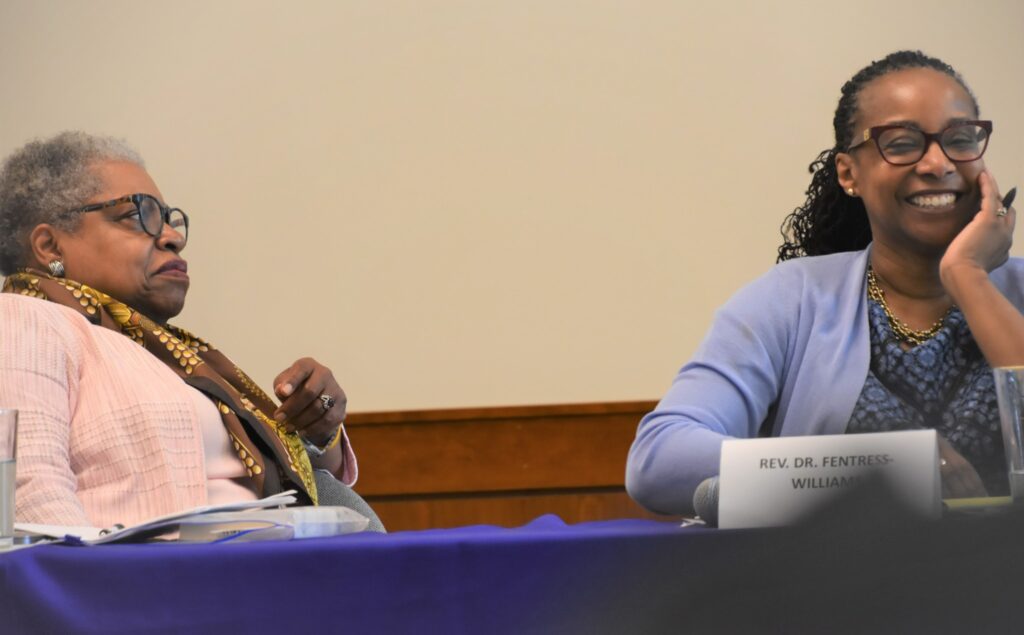
The Rev. Dr. Cheryl Townsend Gilkes (L) with the Rev. Dr. Judy Fentress-Williams (R). Photo: © 2023 Fredericka Sands
Fentress-Williams invited the two speakers, the Rev. Dr. Cheryl Townsend Gilkes and the Rev. Dr. Renita J. Weems, both eminent womanist scholars and pioneers. “I was grateful to have these two remarkable leaders in the same room telling their stories, not just about what had to be overcome but also about their joy,” she said.
The concept of womanism has evolved over the years and is understood differently by different people. Greene explained: “It’s okay to have different definitions of womanism because we’re all internalizing it. That’s part of owning it. For me defining womanism is complicated because I am now heavily influenced by the VTS Womanist Conference, my own experiences, and Alice Walker’s definition in the book In Search of Our Mothers’ Gardens. My hybrid definition is this: Demonstrating via activism, spirituality and ethics a belief in and respect for all women, their talents and abilities; a commitment to the flourishing and wholeness of humankind and creation; and inclusive feminism.”
As a sociologist and author of If It Wasn’t for Women: Black Women’s Experience and Womanist Culture in Church and Community, Gilkes spoke about the emergence, importance, and challenges of womanism in the church, academia, and American society. She entitled her presentation “Why Alice Walker Still Matters”, explaining that Walker shed light on the knowledge created by Black women at every level of life and every discipline, not just academia. “We are celebrating 40 years of womanist thought in the wilderness of America,” Gilkes said.
Gilkes, Professor Emerita of African-American Studies and Sociology at Colby College, led conference attendees along the path of womanist history and history-making figures who have been transdisciplinary pattern masters. She integrated into her remarks an account of her own scholarship and experiences in academia.
Building on Alice Walker’s declaration that “Womanist is to feminist as purple is to lavender,” which the Rev. Dr. Renita J. Weems called a beginning of womanist biblical interpretation, Weems entitled her conference presentation, “Why Choose Lavender when There’s Purple.” Renowned as the first African American woman to earn a doctorate in Old Testament Studies, which she did in 1989 at Princeton Theological Seminary, Weems is a Hebrew biblical scholar and ordained elder in the African American Episcopal Church.
At the conference, she chronicled the path of Black woman intellectuals, thinkers, historians, and scholars of religion through the decades, stating: “We had to invent ourselves and write Black women into view.” She said: “From the 1950s to the 1970s we were drawing on a renaissance of texts, a cauldron of texts.” The 1960s through the 1980s saw “an intellectual ferment and foment that grew out of the Civil Rights Movement and the woman’s rights movement.” Weems added: “Alice Walker was one of a number of Black women intellectuals of the 1970s and 1980s who were challenging the white version of history…. Her writing was part of a larger explosion of Black women’s cultural and intellectual activities.” Weems cited the work of grass roots thinkers, as well as liberal arts scholars, artists, and scholars in the sciences.
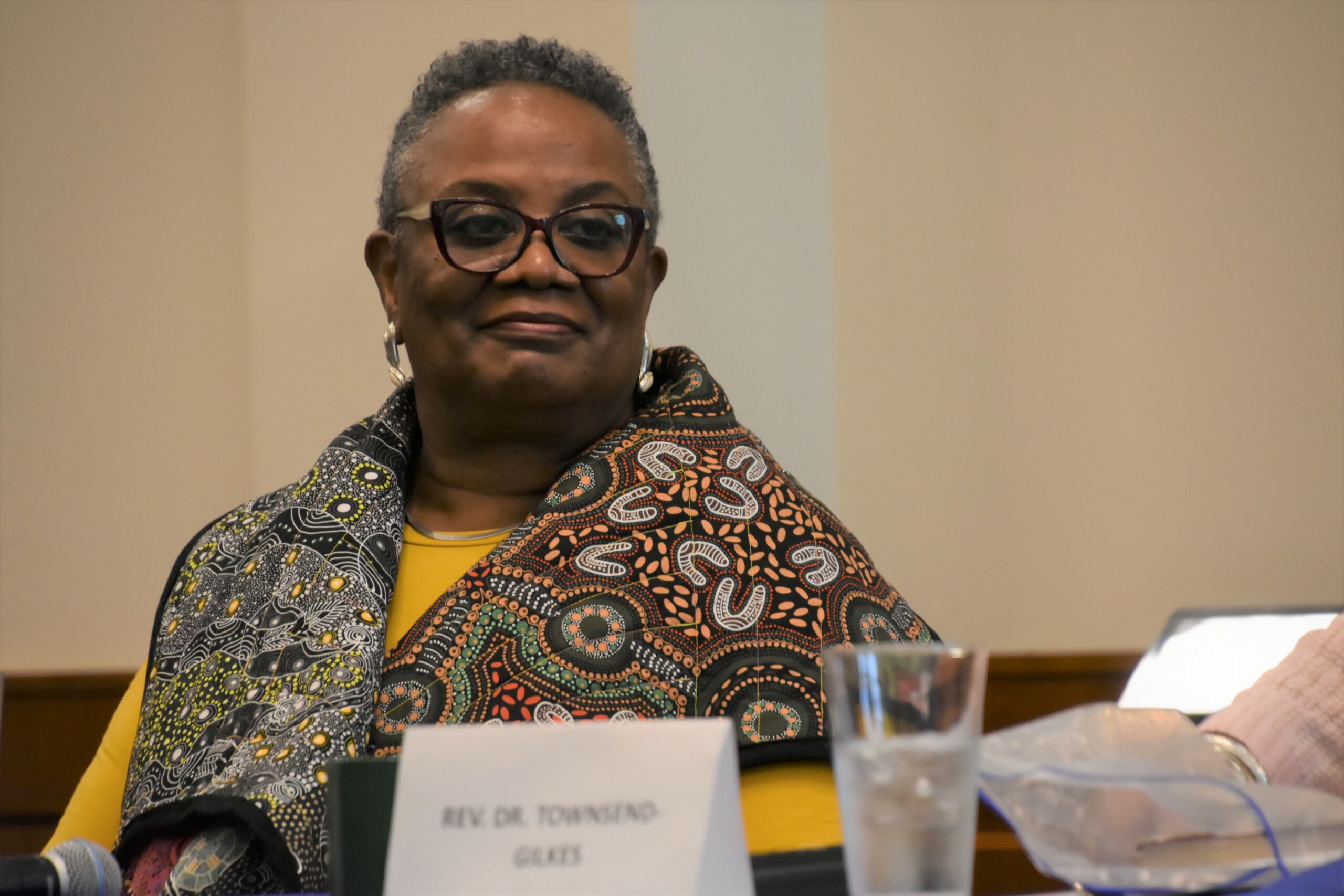
The Rev. Dr. Renita J. Weems. Photo: © 2023 Fredericka Sands
Weems pointed out that in the 1970s and 1980s, there were no books for Black theologians, lauding the “radical, lonely, courageous work” of early womanists, which opened the way to “rethinking, reimagining, reinterpreting” the understanding of history and “recouping Blackness in the Bible.” While describing the achievements and continuing challenges of Black women in academia and the Church, she talked about her own roots, challenges and experience. In thanking Weems, Fentress-Williams said: “You have had the courage and the strength to write Black women into the narrative.”
Conference attendees included students and alumni of VTS and other theological seminaries and university doctoral programs, as well as Alfred Street Baptist Church members, and others. “Some people didn’t register but showed up anyway,” said Greene. She added: “One online participant said at midday, ‘I want to be present.’ She drove from Maryland to VTS to be in the room for the rest of the conference.”
Tonya Johnson came from Ruther Glen, VA, to attend. A 2021 graduate of the Samuel DeWitt Proctor School of Theology at Virginia Union University, she had been introduced to womanist theology there and said: “I wanted to learn more about it and get to meet and hear from the presenters in person. They provided a rich trajectory of their career and let us know what they went through – the good and bad – to survive and thrive in academia.”
Attendee Michele S. Reynolds is a Master of Divinity seminarian at Howard University School of Divinity and Chaplain at Arlington County Detention Facility and Police Department, Arlington, VA. She said: “I enjoyed hearing Dr. Weems speak and preach with truth.” Reynolds explained that, for her, the message from the conference was that “as a Black woman who is clergy and a scholar, I will continue to have a difficult time having a seat and voice at the table without assistance. Shirley Chisolm says, ‘If they don’t give you a seat at the table, bring a folding chair.’”
The Rev. Yaa Addison, ’23, said the conference was as “an opportunity to hear such amazing theologians speak about their work, their own history, their lived experience and how it impacts their theology.” Addison came away with a recognition of how womanist theology has grown. She said: “I want to be able to preach from my perspective as an African American woman in the predominantly white Episcopal Church.” She added that she could be in conversation with others through womanist sources and in person.
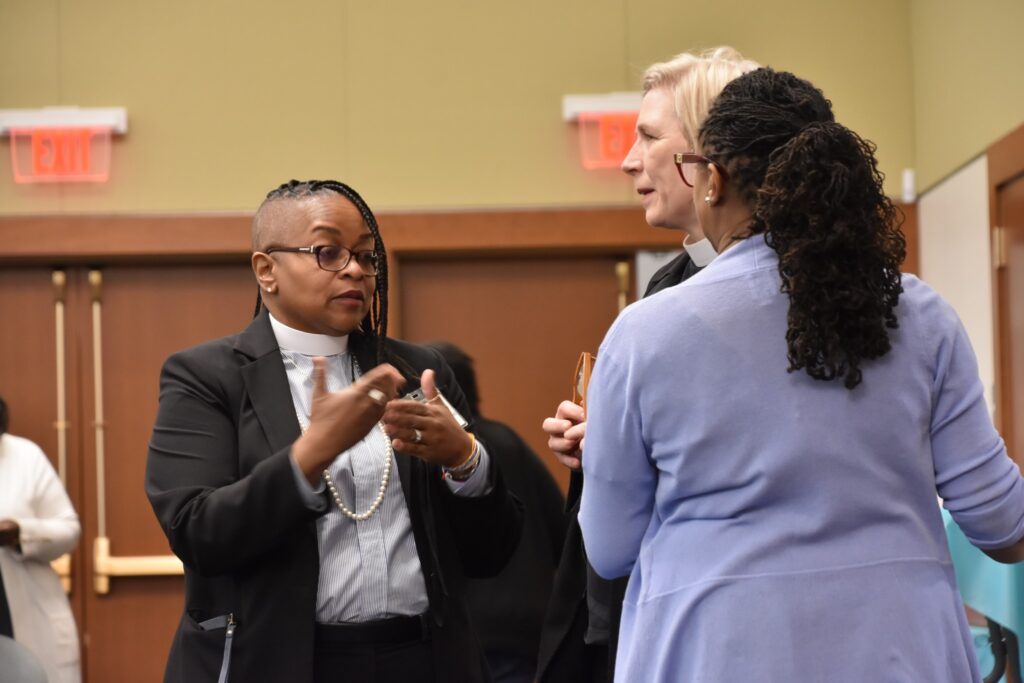
Sharing views. Photo: © 2023 Fredericka Sands
Wanda Walker is president of her Discipleship Group and facilitator for an all-women Village group at Alfred Street Baptist Church. She said: “To sit at the feet [of the speakers] and have the history of womanism said firsthand was so powerful.” A minister in training under Fentress-Williams at Alfred Street, Walker said she went into the conference “wanting a definition of womanism but left feeling that it was not necessary. I realized that womanism is morphing.” The speakers referenced womanism as “a framework that has tentacles and extends into other meanings,” said Walker. She hopes to share knowledge and understanding of Black history and culture, and to nurture one anothering among women.
Another Alfred Street Baptist Church member, Fredericka Sands, J.D., D. Min., said: “I’ve been an acolyte of Dr. Fentress-Williams ever since I took her ‘Bad Girls of the Bible’ seminar through the Washington Theological Consortium.” Sands added: “Each of the VTS conference participants is a womanist theological scholar luminary in her own right. The opportunity to see all three of them together locally was just too great of an opportunity to miss.”
While most attendees were African American women, they ranged in age and background, and were joined by white women and by men, both Black and white. The Rev. Julia Domenick ’22, associate rector of St. John’s Episcopal Church, Boulder, CO, attended the conference remotely. “I gratefully found womanist theology in seminary because of being exposed to it by Dr. Sharon Heaney. As a biracial woman, I finally found myself and much of my experience in their writing. I also found a much more inclusive perspective through them,” she said.
The Rev. Aaron Michael Rogers ’23 said he attended the conference “because I’m a big fan of Renita Weems and wanted to hear her perspective on the development of womanism. The conference was a wonderful mix of practical wisdom for all would-be scholars and a biographic journey through the field of womanism. I learned that the canon of womanist literature and perspectives is incredibly expansive.” he said. “I will use these writings in my preaching and in congregational study to talk about the variety of perspectives that make up our understanding of who we are as a people and particularly a people of faith.”
As a white woman seminarian, Dana Jean ’24 said she attended the conference because womanist theology offers an important perspective, especially to a church that is still largely white and male-centric. “I’m a huge Alice Walker fan. I loved the speakers’ referencing Walker and the importance of her work,” as well as “their ability to weave their stories into the arc of history in relation to womanism and womanist theology,” she said. Jean added: “The conference was especially important to me. I have raised three Black children whose voices are silenced in ways mine is not. From my preaching and teaching to the work of building relationships in the community, I will amplify Black women’s voices as I go forth from this place.”
Thomas Alexander ’24, a white male seminarian at VTS, said: “Upon returning home from the conference, I walked in the door and immediately told my wife, ‘That conference was the single best thing I’ve attended on this campus.’ The speakers were inspiring and the conversations were captivating.” He added: “I learned of so many names and texts. In a way, then, at the conference I learned how much I don’t actually know. I learned that womanism is deeply committed to working across disciplinary divisions – a commitment that I share, particularly in theological education. It is my prayer that this will not be the final womanist conference here at Virginia Seminary.”
That goal is shared by the Rev. Katherine Grieb, Ph.D., Director of the Center for Anglican Communion Studies at VTS. “It was an amazing and powerful day, and a historical event. The suggestion that this should be the first Womanist Conference at VTS received strong acclaim from attendees,” she said.
VTS is excited to be welcoming another group of womanist scholars and practitioners to campus on Wednesday, October 16, for a lecture on Exodus at 9.30 a.m., followed by a panel on Womanism and Resilience at 1.30 p.m. Both events are open to the community.
“Womanist Conference 2023: The Power of Narrative & Voice” can be viewed on YouTube. The links are: Morning Session: https://youtu.be/HUlPA2VzvBc. Afternoon Session: https://youtu.be/VhoBwEvn5xs.

Mitzi Budde, D.Min, Head Librarian and the Arthur Carl Lichtenberger Chair for Theological Research, retires after 33 years. The Rev. A. Katherine Grieb, Ph.D., ’83, reflects on the profound impact she has had on VTS.
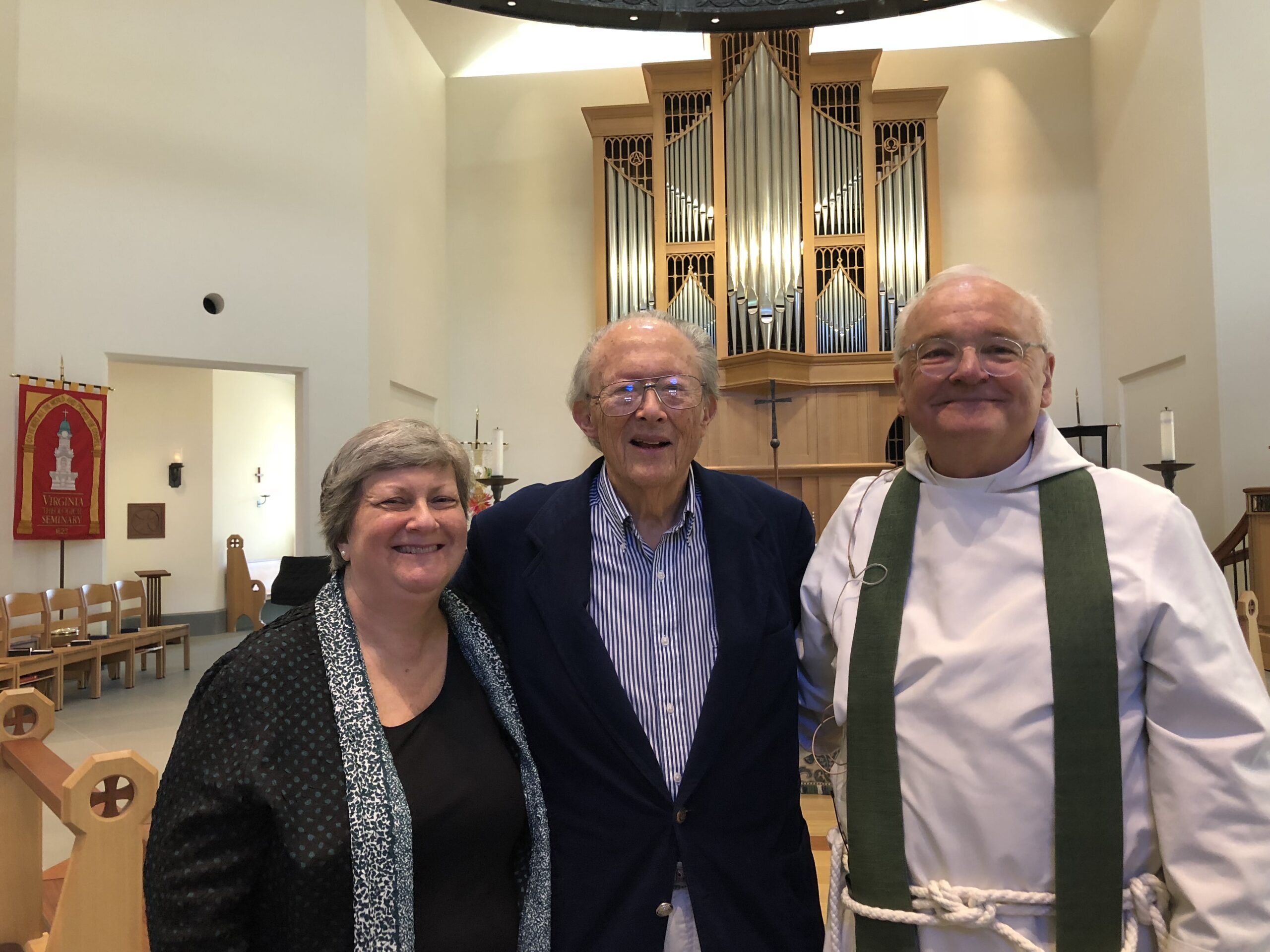
The Thomas Dix Bowers Preaching Fellowship Fund was established at Virginia Theological Seminary on May 6, 2008, by family and friends of the Rev. Dr. Thomas Dix Bowers, VTS ’56.
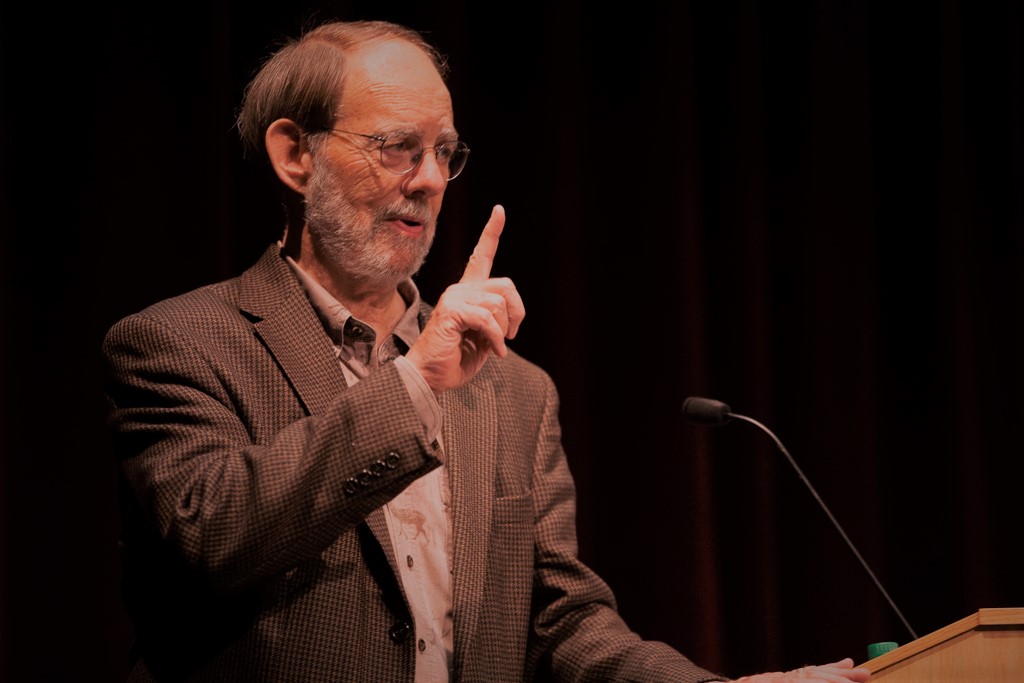
The Rev, Rode Molla, Ph.D., Assistant Professor, and the first Berryman Family Chair for Children’s Spirituality and Nurture at Virginia Theological Seminary, reflects on the legacy of the Rev. Jerome Berryman, D.Min.
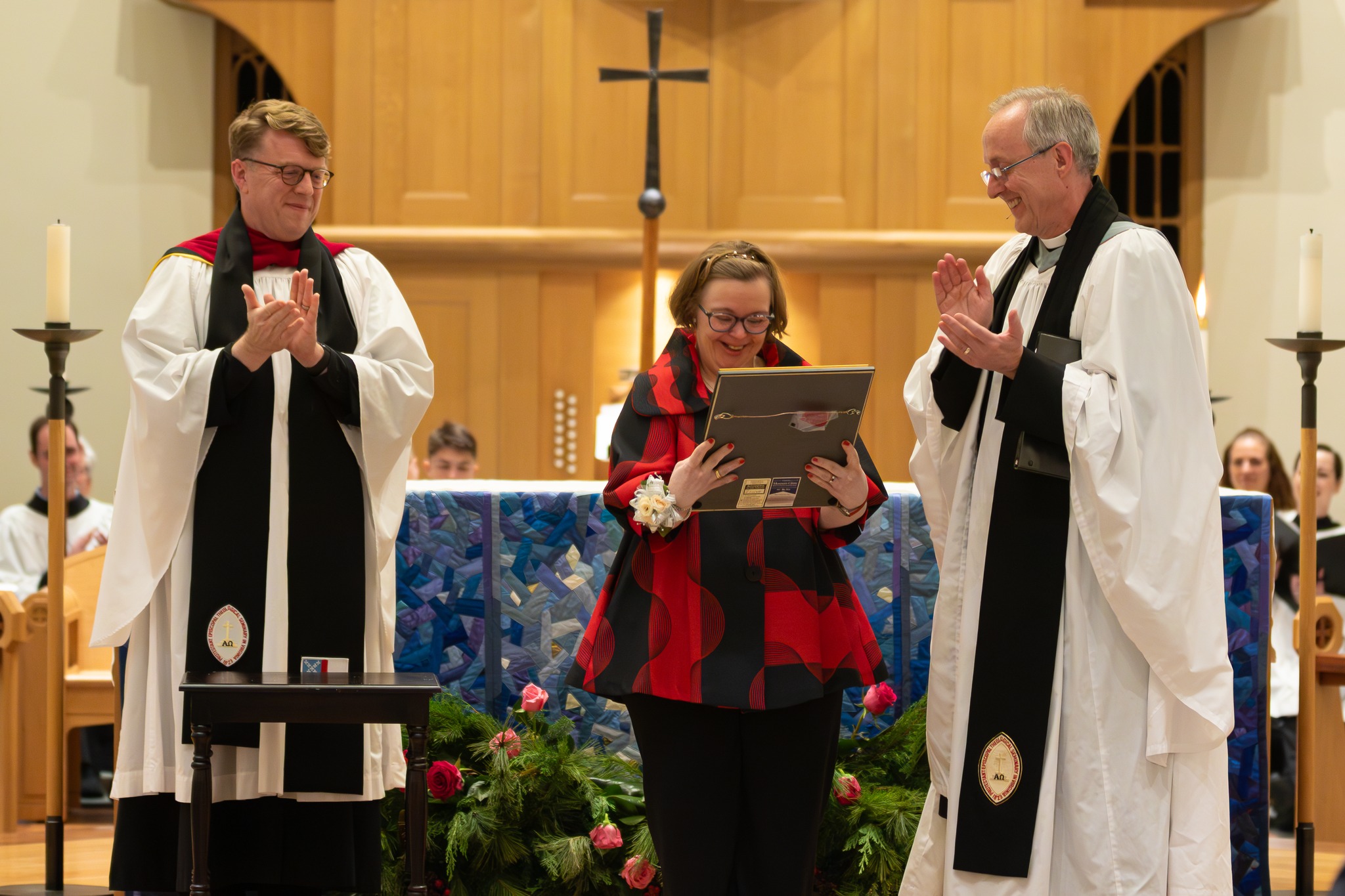
Virginia Theological Seminary was honored to confer the Dean’s Cross for Servant Leadership on Ellen Wofford Hawkins in recognition of her deep faith and ability to bring sunshine into the lives of others.